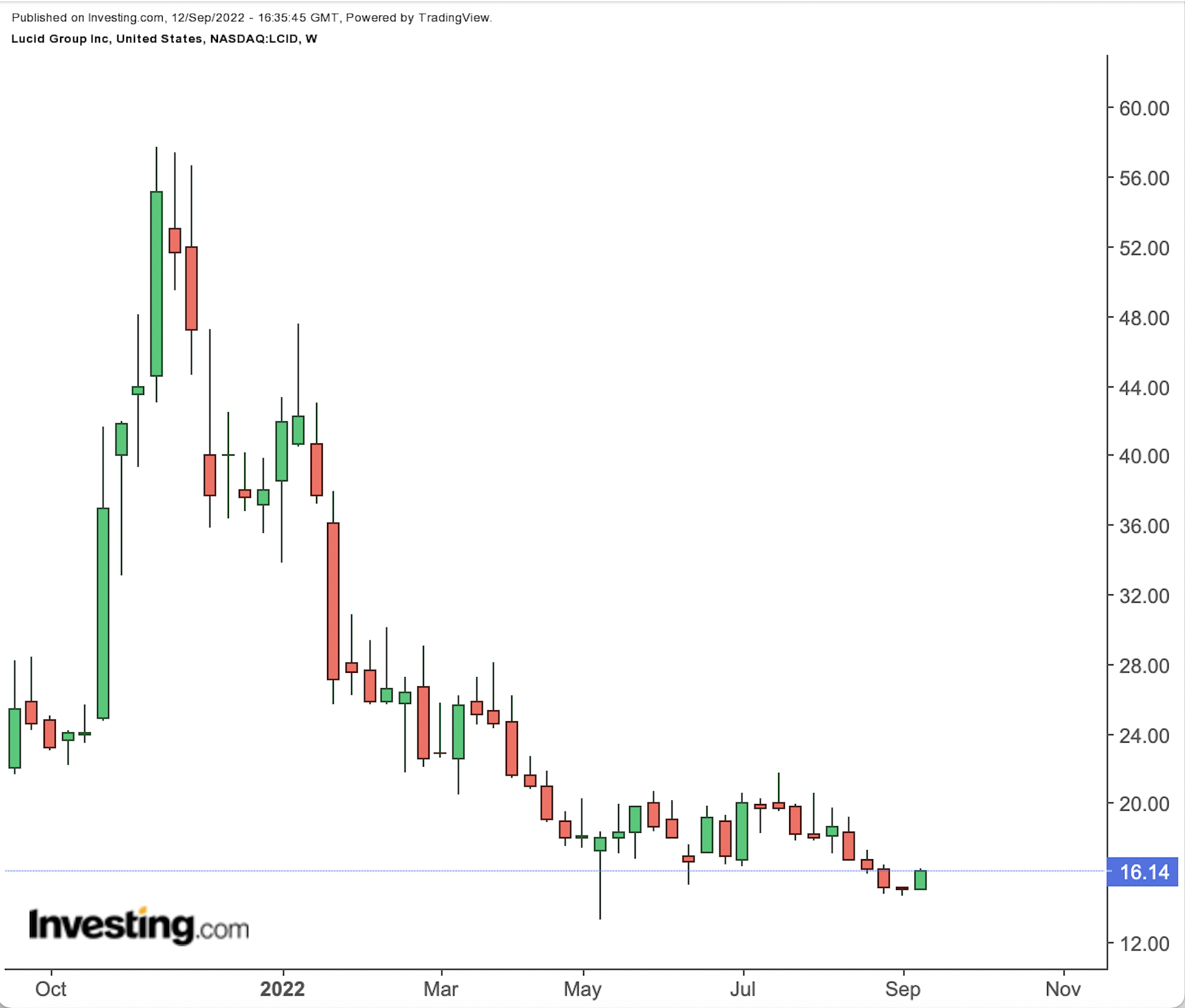- LCID has dropped 70% since December — and the decline seems overwrought
- The company is dealing with short-term challenges, but the long-term outlook remains positive
- Yet, valuation remains a key concern; with a $25-billion market cap, some success remains priced in
Last Tuesday, Lucid Group (NASDAQ:LCID) closed at its second-lowest level since the company officially announced it would go public. Shares have fallen more than 70% from December highs.

Source: Investing.com
That argument is increasingly intriguing with LCID back at $15. But that argument also has one potential flaw.
What’s Gone Wrong For LCID Stock
Again, the case for LCID stock here is that the 70%-plus decline since December is an overreaction. Market sentiment clearly has been a big factor: investors in 2021 were willing to pay almost any price for growth, but here in 2022 the focus has turned to profitability.
That’s a problem for Lucid. Wall Street expects the company to post losses through 2025. But the lack of profits here is not due to a structural flaw with the Lucid business; it’s simply the nature of automotive manufacturing.
It simply takes time to build the massive infrastructure required to build and market vehicles. Tesla (NASDAQ:TSLA) didn’t post its first full-year profit until 2020, 17 years after the company was founded. Investors knew in 2021 it would take years for earnings to arrive; there’s not a clear logic to selling on that basis this year.
To be sure, there is one key concern with the business: Lucid keeps reducing its production outlook. When the merger was announced last year, Lucid projected it would deliver 20,000 vehicles this year. After second quarter earnings, the company reduced its estimate for a second time: Lucid now sees deliveries coming at roughly one-third the originally projected level.
This isn’t a new problem. The start of production of the Air was delayed last year. Given how many electric vehicle manufacturers are racing (no pun intended) to market, the delays raise concern.
That said, the delays also are understandable. Supply-chain problems continue to plague even the industry’s largest players. Meanwhile, demand appears strong: Lucid ended the second quarter with reservations covering about $3.5 billion in revenue.
In other words, customers want to buy the Air. Lucid simply is having trouble producing it. The latter problem is fixable; the former much less so.
The Valuation Question
The case for LCID at $15, then, is the market is focusing on temporary, near-term concerns and, thus, ignoring an attractive long-term opportunity. Taking that long view, there’s still a lot to like here. The Air was named the Motor Trend Car Of The Year. The Lucid Air Sapphire is the most powerful sedan — of any type — in the world.
Lucid has a 10-year agreement with the Saudi government, one of the company’s early investors. Reservation figures show demand from consumers as well. Outside of production targets being pushed back, the company seems on track. There’s little, if anything, here to justify a 70% decline in LCID stock.
Again, it’s an intriguing argument. But there is another possible explanation for the plunge in LCID, and one real concern: valuation.
Lucid still has a market capitalization of $25 billion. Given the need to raise capital — Lucid itself has said it’s only funded through next year — the share count is going to rise, inflating market cap further.
It’s certainly possible that $25 billion is not the ‘wrong’ valuation — but, rather, that the nearly $100-billion market cap assigned last year was the result of an overinflated market. In this context, LCID’s 2022 performance simply is a needed correction.
To be sure, it’s possible that the correction has gone too far. Lucid was able to raise capital at a weighted average of about $12 per share, between the cash from Churchill Capital IV at $10 per share and the PIPE (private investment in public equity) at $15. But that was in February 2021, a time of much higher optimism toward EV startups. For instance, Fisker (NYSE:FSR) has plunged 47% since the Churchill-Lucid merger was announced; sector names like Canoo (NASDAQ:GOEV) and Lordstown Motors (NASDAQ:RIDE) have done even worse.
Pegging valuation precisely here is impossible, given how many moving parts there are in any attempt at fundamental analysis. But simply on its face, a $25-billion valuation for a company barely in production can’t be called “cheap.”
Lucid can grow into that valuation, certainly. The company has plenty of potential, and early news overall looks strong. But the case for buying LCID here isn’t based on the stock being down 70%. It’s based on the business being one that investors want to own.
Disclaimer: As of this writing, Vince Martin is short shares of Tesla. He has no positions in any other securities mentioned.
